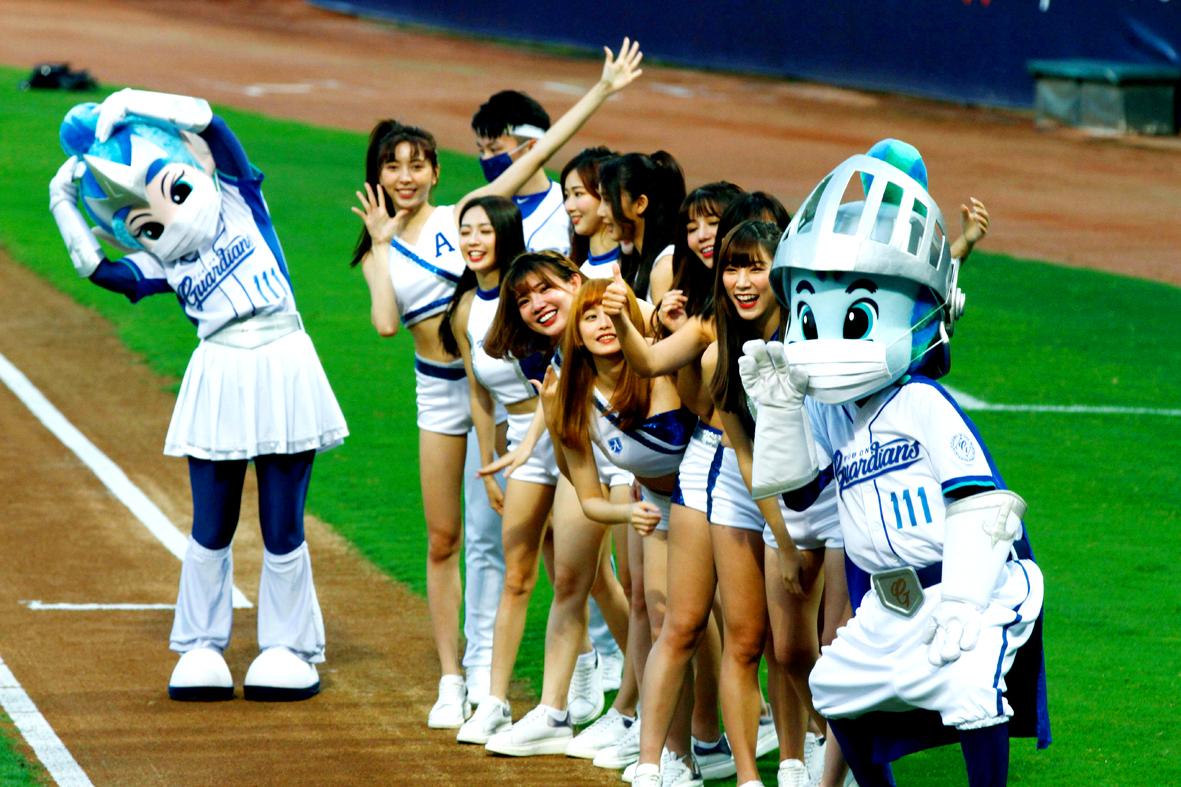Livening up sport without fans is a challenge for competitions returning after the coronavirus, and organizers have tried several ways to make empty stadiums more appealing.
After South Korean football club FC Seoul was accused of placing sex dolls in the stands, AFP Sport looks at some of the innovations:
TAIWAN’S ROBOT DRUMMERS

Photo: AFP
Sport took a surreal twist when Taiwan’s baseball league started last month, with robots providing live music as they drummed in the stands. In what could have been a scene from Star Wars, a group of robots — some wearing wigs — banged drums for Rakuten Monkeys’ opening game. Mannequins wearing team colors were placed around the stadium, along with cardboard cut-outs of fans, media and players’ family members.
GERMANY’S CROWD SOURCING
Cardboard cut-outs have been a popular way to fill empty seats, but German football club Borussia Moenchengladbach took the idea a step further and gave fans the chance to have life-sized images of themselves in the stands. Thousands of people have taken up the offer, where they pay 19 euros to have their image placed in the Borussia-Park stadium.
“The campaign organizers are regularly overrun with orders — we can hardly keep up trying to install them all,” fan representative Thomas Weinmann told the Bundesliga Web site.
SOUTH KOREA’S PIPED NOISE
The sound of tinny, recorded cheering has replaced the spine-tingling roar of the crowd in some stadiums. In South Korea’s K-League, recordings of popular chants have echoed around the country’s empty football venues, some of which hosted games at the 2002 World Cup. Meanwhile, TV viewers of Australian Rules football will hear pre-recorded crowd noises laid over the match footage when games return next month.
“We’ve had a number of different trials and consulted a number of people, including from the movie business, just to get it right,” Lewis Martin, managing director of broadcaster Channel Seven, told AFL.com.au.
APP-LAUSE
Meanwhile, software developers have launched an app, MyApplause, which allows fans to create crowd noise from their homes.
Users can choose from cheering, clapping, chanting and whistling, and the resulting noise is played over the stadium loudspeakers and the spectators’ home sound systems. Team-specific logos and chants are available.
South Korean baseball has also taken a high-tech approach with fans beamed onto a stadium big screen as they watch the game online.
BASEBALL BARBECUE
Baseball cheerleaders in Taiwan have been carrying out live interactions with fans from the stadiums, chatting and broadcasting dance routines over their mobile phones. One cheerleader even cooked and ate a barbecue while sitting in the stands, while streaming herself on the Internet.
Taiwan’s baseball league has enjoyed unaccustomed popularity during the coronavirus, with millions of sport-deprived fans watching English-language commentaries from overseas.
“We’ve talked about the food, the people, the way we’ve treated COVID-19 and the way we’ve contained it — it’s just been amazing exposure for Taiwan,” said English-language commentator Wayne McNeill.
‘SEX DOLLS’
But by far the most attention has been generated by South Korea’s FC Seoul, who were accused of putting sex dolls in their seats after mannequins advertising adult toys appeared at their match on Sunday.
FC Seoul denied the figures, reportedly provided by a distributor who offered them for free, were sex toys.
“We are sincerely sorry for causing deep concern to fans,” said a statement from the club, which is facing disciplinary proceedings.

June 9 to June 15 A photo of two men riding trendy high-wheel Penny-Farthing bicycles past a Qing Dynasty gate aptly captures the essence of Taipei in 1897 — a newly colonized city on the cusp of great change. The Japanese began making significant modifications to the cityscape in 1899, tearing down Qing-era structures, widening boulevards and installing Western-style infrastructure and buildings. The photographer, Minosuke Imamura, only spent a year in Taiwan as a cartographer for the governor-general’s office, but he left behind a treasure trove of 130 images showing life at the onset of Japanese rule, spanning July 1897 to

One of the most important gripes that Taiwanese have about the Democratic Progressive Party (DPP) is that it has failed to deliver concretely on higher wages, housing prices and other bread-and-butter issues. The parallel complaint is that the DPP cares only about glamor issues, such as removing markers of Chinese Nationalist Party (KMT) colonialism by renaming them, or what the KMT codes as “de-Sinification.” Once again, as a critical election looms, the DPP is presenting evidence for that charge. The KMT was quick to jump on the recent proposal of the Ministry of the Interior (MOI) to rename roads that symbolize

On the evening of June 1, Control Yuan Secretary-General Lee Chun-yi (李俊俋) apologized and resigned in disgrace. His crime was instructing his driver to use a Control Yuan vehicle to transport his dog to a pet grooming salon. The Control Yuan is the government branch that investigates, audits and impeaches government officials for, among other things, misuse of government funds, so his misuse of a government vehicle was highly inappropriate. If this story were told to anyone living in the golden era of swaggering gangsters, flashy nouveau riche businessmen, and corrupt “black gold” politics of the 1980s and 1990s, they would have laughed.

In an interview posted online by United Daily News (UDN) on May 26, current Chinese Nationalist Party (KMT) Chairman Eric Chu (朱立倫) was asked about Taichung Mayor Lu Shiow-yen (盧秀燕) replacing him as party chair. Though not yet officially running, by the customs of Taiwan politics, Lu has been signalling she is both running for party chair and to be the party’s 2028 presidential candidate. She told an international media outlet that she was considering a run. She also gave a speech in Keelung on national priorities and foreign affairs. For details, see the May 23 edition of this column,